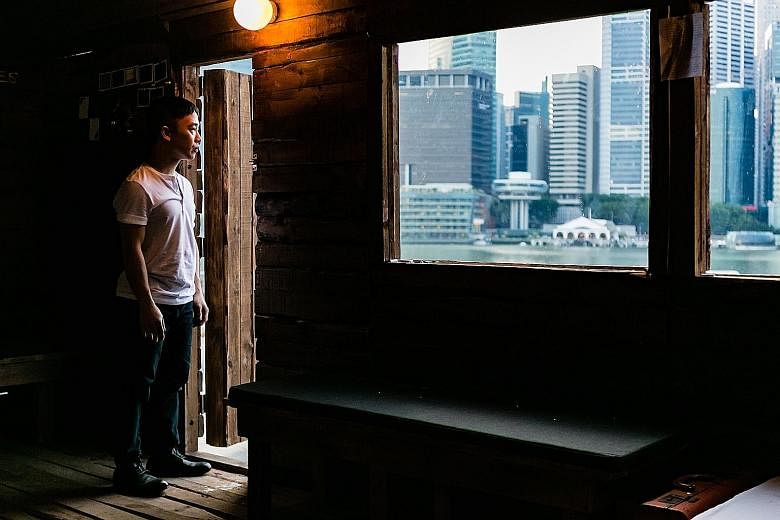REVIEW / THEATRE
TIME BETWEEN US
Marina Bay Sands Events Plaza/ Wednesday
Wood, chalk, paper and the spoken word were all home-grown actor- director Oliver Chong needed to bring alive Argentine dramatist- artist Fernando Rubio's moving meditation on how fleeting life is.
At 10am on Wednesday, Chong began his 108-hour stay by the Singapore River in a snug, rough-hewn house - a long room, really - made of wood salvaged from houses of yore.
In the distance were the skyscrapers of the Central Business District while outside, hordes were catching Pokemons.
In the evening, as part of the Singapore International Festival of Arts, his audience of 18 filed into his digs, which can seat only 25 people comfortably, their backs to the wall.
-
BOOK IT /SINGAPORE INTERNATIONAL FESTIVAL OF ARTS: TIME BETWEEN US
-
WHERE: Marina Bay Sands Events Plaza, 10 Bayfront Avenue
WHEN: Till Sunday, 5.45pm daily
ADMISSION: $10 a person. Oliver Chong first regales you with stories and, from 7pm, hosts a guest speaker (actress and arts educator Noorlinah Mohamed today; dramatist Natalie Hennedige tomorrow and film-maker K. Rajagopal on Sunday). As the venue can take only 25 audience members, it is best to arrive 15 minutes before each session to avoid disappointment. You can knock on Chong's door any time before or after these sessions and he might let you in.
The diminutive Chong, sporting a crew cut, crisp white T-shirt, jeans and kick-your-head-in shoes, bolted the door, the harsh "clack!" sending a frisson of alarm through the assembly. What might he do?
To begin with, he whipped out a Polaroid camera, snapped the prettiest woman in the room and put the photograph up on the wall.
On one section of the ceiling, he had written in chalk a litany beginning with "airport floors" and ending with "turbulent motion".
On the walls, also in chalk, were words such as "I open up" and "mornings, afternoons and nights… transformations".
On his bed frame in chalk were capital letters that spelt out "Forever". On the uneven floor were chalk drawings of a sun and the outline of a dead body.
Curiously, the dimly lit room radiated calm from the get-go, the hum from its air-conditioner an Om-like mantra to relax and reflect.
In the half-light, Chong recalled laughing children, men walking their dogs and lost love.
He also kept darting about, now lounging on his pristine bed, then lolling about on the floor, now turning over floor slats to reveal scrunched-up letters, then puffing on a cigarette languidly.
Throughout, he wondered: What was "the solution to being alive"?
His hold on the audience was born from their trusting anticipation, but he wielded his power with a sure and gentle intensity, making his 45-minute performance deeply affecting but never unsettling.
At no time did he offend anyone, even when he pointed randomly at audience members, calling someone a loner or a spy, and in the next breath, calling the spy a loner and the loner a spy.
"What price memory?", Rubio seemed to be asking with this sequence.
Rubio's view, the audience came to see, was that even the briefest and most trivial encounters and exchanges, the "time between us", transformed a person's life and such transformation was the rewarding, enriching flip side of impermanence.
Each day, Chong hosts a guest speaker. This evening, sociologist Chua Beng Huat stopped by with his life stories - of his family surviving the Bukit Ho Swee fire of 1961, of never having left school, of becoming an academic because that meant he would never have a boss.
Chua was a Socratic presence, peppering Chong and audience members with questions: How many of their schools were still standing? How many times had they moved house? How was religion trumping culture?
Chua's questioning of Chong revealed an artist torn between fasting and feasting, trends and traditions, talent and obligation.
Thus did Rubio's marrying of Chong's performance with his nightly question-and-answer session yield a rounded and richly textured experience for the audience.
Visit Chong while you can. You will find peace in his bubble. You might even find yourself.


